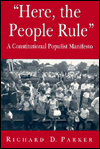

 |

|

The average rating for "Here, the people rule" based on 2 reviews is 3.5 stars.
Review # 1 was written on 2018-08-11 00:00:00 Betarice Sutton Betarice SuttonAn interesting polemic that criticizes supporters of the judiciary as a countermajoritarian institution. The book essentially argues that a certain sensibility (in contrast to a well defined and explicit ideal) dominates constitutional law making. This sensibility is an elitist view that shuns "ordinary people" and "ordinary politics" as mob-like, easily manipulated, and irrational. Instead, this sensibility wants to vest constitutional law making with a elites who are characterized as dispassionate, and rational. As a result scholars and the elites have focused on taking constitutional law out of the hands of the ordinary people, and turning it into a "higher law" that binds the will of the ordinary people. The book criticizes what it sees is this prevailing sensibility. Instead of celebrating the allegedly disinterested, above-it-all, elite, the book criticizes him for being detached and passive in the face of active ordinary people (in addition to the fact that the elite is rarely so "disinterested" and occasionally stoops to manipulating the crowd). One of the more interesting ideas in the book was the connection between the right answer thesis and "higher law" making. The book argues that one of the arrows in the quiver of those seeking to take constitutional law out of the hands of the ordinary people is that the law read properly produces a right answer to legal disputes. The book goes on to argue, that by treating law as a discipline that produces objectively correct answers, this concentrates power at the hands of those who hold themselves out to be trained in divining those answers (i.e. lawyers). In a sense, the book reminded me of Nietzsche's celebration of the dionysian (overwhelming emotion) over the apollonian (order and logic). The book also dovetails nicely into Ackerman's book Private Property and the Constitution, which takes the opposite view. Ackerman argues in that book that there are those who want to make property law conform to ordinary understandings of property, and those who want to put property law in the hands of scientific policymakers, and that the latter is correct. On a very general level, the book plays into the divide between meritocracy and democracy. To an extent, the tension between a special priesthood administering the laws, and the liberal conception of reason being generally accessible to all has been around since society organized itself (for example, the ancient Chinese philosophy of Legalism insisted on widespread memorization of the laws, to disable officials from abusing their position by making up laws). That divide probably explains the appeal of textualism and reaction against common law-like conduct in modern day. Textualism holds itself out to be more democratic because anyone can learn to read and understand text, in contrast to common law where judges and lawyers make up law in ways that only those who are legally trained can understand. The book is more of an abstract thought piece, than a rigorous argument. That form has an advantage in that it generates interesting discussion and thoughts, but the disadvantage of being unfalsifiable. Worth a read. |
Review # 2 was written on 2017-12-30 00:00:00 Chris Moreton Chris MoretonI don't think I had the necessary background to fully grasp all the nuances of Parker's argument, but I found this to be interesting. |
CAN'T FIND WHAT YOU'RE LOOKING FOR? CLICK HERE!!!